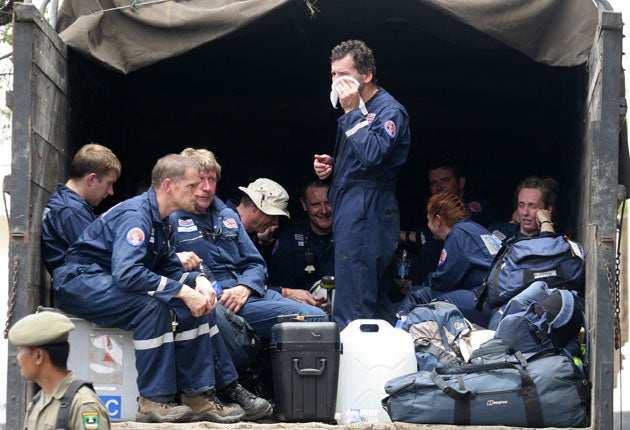British rescue teams arrive 'too late' to help in Sumatra
Official emergency teams did not reach devastated island until three days after the earthquake

Your support helps us to tell the story
From reproductive rights to climate change to Big Tech, The Independent is on the ground when the story is developing. Whether it's investigating the financials of Elon Musk's pro-Trump PAC or producing our latest documentary, 'The A Word', which shines a light on the American women fighting for reproductive rights, we know how important it is to parse out the facts from the messaging.
At such a critical moment in US history, we need reporters on the ground. Your donation allows us to keep sending journalists to speak to both sides of the story.
The Independent is trusted by Americans across the entire political spectrum. And unlike many other quality news outlets, we choose not to lock Americans out of our reporting and analysis with paywalls. We believe quality journalism should be available to everyone, paid for by those who can afford it.
Your support makes all the difference.A new system for organising Britain's official high-speed response to international emergencies failed to get a team of rescuers to help people trapped by the Indonesian earthquake until more than three days after the first tremors, it emerged yesterday.
A team of rescuers put together by the British Government to help was due on the island of Sumatra last night, three days after a huge quake brought down hundreds of buildings – and hours after British volunteers already on the ground claimed there was no one left to save.
A team of 65 UK firefighters – being paid at a rate of time and a half by the taxpayer – plus humanitarian experts was delayed by 24 hours and plunged into a desperate struggle to find a new aircraft after their original plane developed a technical fault on Friday. The official team, put together by the Fire and Rescue Services (FRS) and the Department for International Development (DfID), eventually left from RAF Brize Norton after they were allocated a C17 military transport aircraft. The team was due to arrive late last night, but there were reports they would be told they would not be needed.
But expert rescue teams from at least two British volunteer organisations – warning that speed is of the essence in earthquake rescue work, and having set out 18 hours earlier – had already been in the disaster zone for almost two days, having had to travel there independently of the Government. The organisations claimed they had been "cold-shouldered" by the British authorities under a new system which gave fire chiefs responsibility for organising the UK's official response to overseas emergencies.
Earlier this year, The Independent on Sunday revealed that Britain's volunteer lifesavers feared the secret deal could jeopardise the lives of thousands of people in disaster zones around the world. Critics yesterday claimed the confusion over the Sumatran rescue mission reinforced complaints about the long-term impact of the new arrangements. One veteran of many earthquakes said: "This was a textbook version of how not to do earthquake rescue." Others were more diplomatic. "We had been told to expect a call from DfID to find out how we could help the official rescue effort," said Julie Ryan of the International Rescue Corps, which has experience of helping in disaster zones around the world. "We didn't hear anything from them, so we made our own arrangements. It's quite sad that they didn't try to get us involved."
Graham Payne of Rapid-UK, which sent a rescue team to Padang on Friday, said his organisation had not been asked to be part of the official UK effort.
"They haven't phoned up and we have done it independently," Mr Payne said. "I think we have been cold-shouldered."
John Holland, who headed the Rapid-UK team in Padang, said yesterday that there were enough rescue workers in the disaster zone, and he believed there were no more survivors to be pulled from the hundreds of collapsed buildings in the area. "We are trying to discourage more teams from coming in as they are clogging up the airport, preventing longer-term relief from coming in," said Mr Holland. "It is at this stage that we, as rescue specialists, tend to move out to allow the recovery stage and the longer-term work to take place. What is needed now is to get aid in, not more rescue teams."
The International Development Secretary, Douglas Alexander, said earlier this year that the changes to the rescue set-up aimed to establish "a more efficient and workable arrangement" for providing help in overseas emergencies. He said the decision to go above the charities' heads was taken as "they were finding it difficult to co-operate and reach agreement" – a claim the groups furiously denied.
A DfID spokesman yesterday said that the emergency response system was revamped last year in order to "draw on the expertise of the Fire and Rescue Service and the voluntary sector quickly and effectively during humanitarian crises".
He added: "It was decided that the UK Fire and Rescue Service should take responsibility for organising the Government's overseas search-and-rescue responsibilities following extensive discussions between the department and voluntary organisations.
"Under the arrangement, the Fire and Rescue Service can work directly with voluntary groups and has the option of asking them to deploy support for operations if required."
The shadow International Development Secretary, Andrew Mitchell, said: "Our sole concern at the moment must be to get help to the people who need it. But when the dust has settled, we must look again at the UK's procedures for co-ordinating and managing disaster responses to ensure that the energy and resources of leading disaster response NGOs are backed up by effective co-ordination and direction from Whitehall."
Join our commenting forum
Join thought-provoking conversations, follow other Independent readers and see their replies
Comments